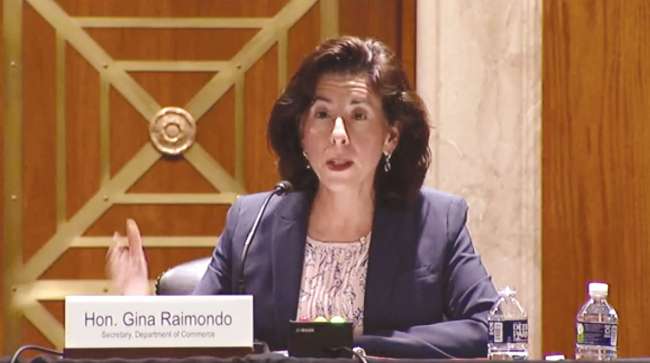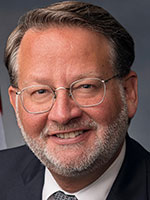Senior Reporter
Raimondo Urges Congressional Passage of Semiconductor Bill

[Stay on top of transportation news: Get TTNews in your inbox.]
Secretary of Commerce Gina Raimondo pressed senators April 27 to finalize legislation meant to boost domestic manufacturing of semiconductors.
The secretary expressed a sense of urgency before a hearing of the Commerce Committee on April 27 as key policymakers seek to arrive at a final version of the comprehensive semiconductor funding package.
Versions of a semiconductor funding bill recently have gained approval in the U.S. House and Senate. The Senate version is referred to as the U.S. Innovation and Competition Act (USICA).

Cantwell
“The need is urgent, as the chairwoman said. Commerce Department has key priorities in the bill, many of which are this committee’s priorities as well, including the $52 billion for chips funding, tech hubs, supply chain authorities,” Raimondo said, referring to Commerce Committee Chairwoman Maria Cantwell (D-Wash.), an ardent supporter of the measure.
“I cannot say strongly enough the urgency with which we must act. Other countries aren’t waiting for us. China has invested $150 billion. Germany, Singapore, Spain, France are all investing,” the secretary added. “Time for us to act is now.”
Raimondo explained further that the approval of federal incentives designed to target the semiconductor industry likely would increase domestic production.
“If we don’t act quickly with USICA they’ll build elsewhere,” she said. “If we do act quickly, they’ll build here.”
Cantwell and several colleagues on the panel echoed the secretary’s sentiment, urging Congress to support a final version of a USICA bill. “Obviously, the agency, if the U.S. Innovation and Competition Act would pass, would receive $52 billion in funding to help us with this chip supply chain shortage.”

Peters
Sen. Gary Peters (D-Mich.), chairman of the Surface Transportation, Maritime, Freight, and Ports subcommittee, told the secretary he agreed it is essential to fund domestic semiconductor programs “so we can grow good-paying jobs here in America involved in designing semiconductor chips.”
“In a modern economy, chips play a vital role certainly in many different areas. But there’s no better example in my mind than the auto industry,” Peters emphasized.
Partly as a result of supply chain bottlenecks, recent access to semiconductor chips for electronics and commercial transportation equipment has decreased.
On the House side, Speaker Nancy Pelosi’s leadership team has signaled cooperation with its Senate counterparts on the semiconductor legislative package.

Pallone
“We are ensuring that America can outcompete the rest of the world by ending our reliance on other nations for the manufacturing of critical goods,” House Energy and Commerce Committee Chairman Frank Pallone (D-N.J.) said recently. “We must now work with the Senate to quickly reconcile our bills into final legislation that can become law.”
At the White House, President Joe Biden and his senior staff point to the potential for dedicating about $52 billion in new funding for the semiconductor sector with the bill’s approval.
“These investments in semiconductors are crucial and must be complemented by investment in other advanced technologies as well, including the research and development leading to the next generation of these technologies, and related workforce development,” according to background the White House provided. “These investments are critical to making our economy stronger and more resilient, and to protect our national security. That’s why the administration officials urged Congress to move quickly to get legislation to the president’s desk for his signature.”
Industry leaders, such as Intel Corp., are among stakeholders urging Congress to approve the legislation.

Intel CEO Pat Gelsinger (David Paul Morris/Bloomberg News
“Time is of the essence,” Intel Corp. CEO Pat Gelsinger told senators last month. “American businesses in every sector across the economy are facing a semiconductor shortage, and the only way to alleviate the current supply-demand imbalance long term is to increase manufacturing capacity.”
The president’s fiscal 2023 budget for the Commerce Department seeks to facilitate the flow of freight across supply chains, as well as respond to climate change concerns and enhance access to broadband. The $11.7 billion discretionary funding request proposes $372 million for the National Institutes of Standards and Technology’s manufacturing programs, and more than $150 million for the Economic Development Administration.
In a statement specific about the budget request, Raimondo observed: “These historic investments, including $372 million to enhance the Commerce Department’s manufacturing programs and make America’s small and medium manufacturers more competitive, will help to create jobs, build a more resilient workforce and supply chains in the wake of the COVID-19 pandemic and increase American competitiveness in a 21st century global economy.”
Want more news? Listen to today's daily briefing below or go here for more info:




